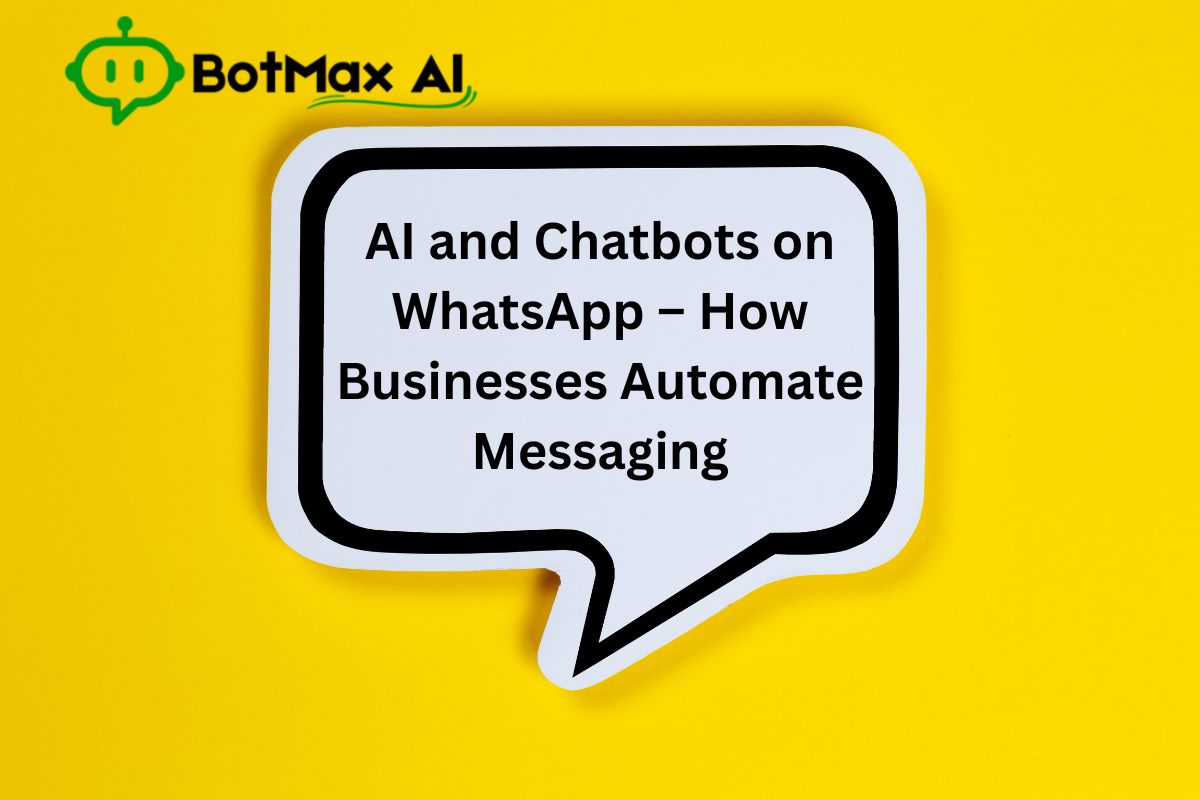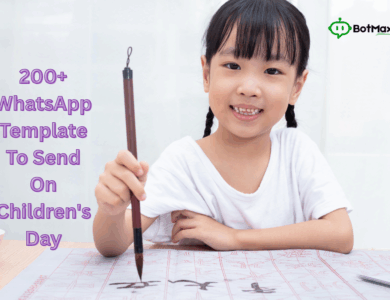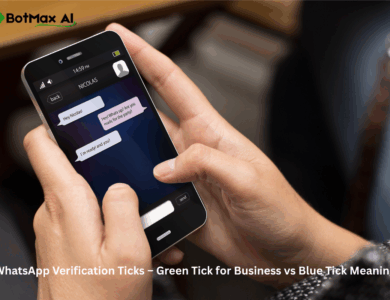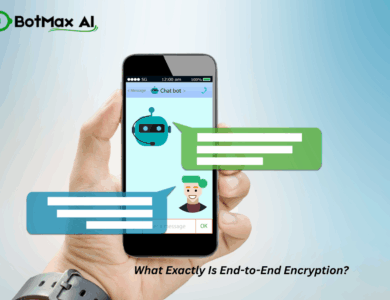
Ever wondered how big brands reply instantly on WhatsApp — no matter the time?
In today’s digital-first world, customers expect real-time responses. They no longer have the patience to wait hours for a reply or be put on hold. For businesses, relying on manual replies 24/7 is simply impossible.
This is where automation steps in. AI-powered chatbots are rapidly transforming WhatsApp from a simple messaging app into a powerful business automation hub.
This article explains how AI works on WhatsApp, its real-world benefits, and how any business (even small ones) can start automating chats using platforms like BotMax AI.
The Rise of WhatsApp as a Business Platform
With over 2 billion active users globally, WhatsApp is no longer just for personal chats. It has evolved into a core communication channel for businesses to connect with their customers.
To cater to this, Meta (the parent company of WhatsApp) offers two distinct solutions:
- WhatsApp Business App: Designed for very small businesses, this app allows for manual replies, a basic business profile, and simple message templates. It’s a step up from a personal account but isn’t built for automation or scale.
- WhatsApp Business API: This is the official gateway for medium and large businesses to scale their communications. The API (Application Programming Interface) allows for deep integration, automation, and the connection of AI-powered chatbots.
What Are WhatsApp Chatbots?
A WhatsApp chatbot is an AI or rule-based software system that automatically answers customer messages on WhatsApp. It simulates a human conversation to provide information, answer questions, or complete tasks.
There are two primary types of WhatsApp chatbots:
1. Rule-Based Bots
These are the simplest form of chatbots. They operate on a set of pre-defined rules and respond to specific keywords.
- Example: If a user types “Price,” “Timing,” or “Support,” the bot will provide a pre-written response associated with that keyword.
2. AI-Powered Bots
These advanced bots use Natural Language Processing (NLP) to understand the intent behind a user’s message, even if it’s phrased in different ways. They can handle complex, contextual conversations.
- Example:
- Customer: “Can I book an appointment for tomorrow?”
- AI Bot: “Sure! I can help with that. Please share your preferred time and full name to get you scheduled.”
How WhatsApp Chatbots Work (Step-by-Step)
Understanding the flow helps demystify the technology. Here’s a simple overview:
- A customer sends a message to your business’s WhatsApp number.
- The message is received by the official WhatsApp Business API.
- The API securely forwards the message to your chatbot engine (e.g., the BotMax AI platform).
- The chatbot analyzes the text, detects the customer’s intent (like asking for an order status), and formulates the correct response.
- The response is sent back through the API and delivered to the customer on WhatsApp, all within seconds.
- The conversation continues automatically or is seamlessly escalated to a human agent if the query is too complex or the customer requests it.
Benefits of Using AI Chatbots on WhatsApp
Integrating AI-powered automation into your WhatsApp channel unlocks powerful benefits:
- ✅ 24/7 Availability: Your business is always “open.” Customers can get instant answers anytime, even at 3 AM.
- ✅ Instant Responses: No more waiting. Instant engagement significantly reduces the chances of a customer-facing to a competitor.
- ✅ Cost-Effective: A single bot can handle thousands of conversations at once, dramatically lowering the workload on your human support staff.
- ✅ Scalability: Whether you have 10 messages or 10,000, a chatbot scales instantly without any drop in performance.
- ✅ Lead Qualification: Bots can automatically ask qualifying questions, capturing names, emails, budgets, or order info, and send clean data to your CRM.
- ✅ Personalization: By connecting to your business systems, AI bots can access user history to provide truly contextual replies, like “Welcome back, Ankit!”
Real-World Use Cases for WhatsApp Automation
The application of WhatsApp chatbots spans every industry:
- E-commerce: Automate order tracking, recommend products based on past purchases, recover abandoned carts, and even share secure payment links.
- Education & EdTech: Send automated course updates, schedule classes, collect new student enrollments, and answer common syllabus questions.
- Healthcare: Manage appointment reminders, send prescription notifications, and provide follow-up care instructions.
- Travel & Hospitality: Send booking confirmations, offer digital check-in reminders, and upsell services like tours or room service.
- Real Estate: Instantly auto-qualify new leads by asking about budget and location, then schedule property tours with available agents.
- Customer Support: Handle the vast majority of common FAQs (e.g., “Where is my order?”) and create support tickets, freeing up human agents for complex issues.
Mini-Example in Action:
Imagine a customer asking: ‘Is my order shipped?’
A WhatsApp AI bot, integrated with your CRM or e-commerce platform, can check the system instantly and reply:
‘Yes! Your parcel was dispatched today via BlueDart, tracking ID: BDX7284. You can track it here: [link]’
Tools Needed to Build a WhatsApp Chatbot
To set up a working, official WhatsApp bot, you need a few key components:
- WhatsApp Business API Access: The official gateway from Meta.
- A Verified Business Number: A phone number dedicated to your business API.
- An Automation Platform: A no-code platform like BotMax AI that connects the API to your workflows.
- Message Templates (HSMs): Pre-approved messages required for starting conversations with customers (proactive outreach).
- Conversation Logic: The AI or rule-based flows that define how your bot will respond.
The Role of AI in WhatsApp Chatbots
The “AI” layer is what makes a modern chatbot so powerful.
- Natural Language Understanding (NLU): This is the core technology. It allows the bot to interpret user intent, regardless of typos, slang, or phrasing.
- Learning Models: AI models can learn and improve from past interactions, becoming more accurate over time.
- Contextual Replies: By integrating with CRMs or even Google Sheets, the AI can pull customer data to provide personalized, contextual answers.
- Conversational Tone: Modern platforms use generative AI to sound more human and conversational, not robotic.
For example, instead of replying with a cold, “Invalid input,” an AI-powered bot says:
“Hmm, I didn’t quite get that — could you tell me your order ID again?”
WhatsApp Business API – The Backbone of Automation
It’s crucial to understand that true automation is only possible through the official WhatsApp Business API. This service is provided by Meta through authorized Business Solution Providers (BSPs).
The API is what allows for message automation, broadcasting to large lists (using templates), and integration with chatbots and other business software. It offers secure, end-to-end encrypted delivery for every message.
Using the standard Business App or unofficial “hacking” tools will not work for automation and carries a high risk of your number being permanently banned by WhatsApp.
💼 How BotMax AI Helps Businesses Automate WhatsApp
This is where it all comes together. BotMax AI is an all-in-one automation platform built on the official WhatsApp Business API, designed to make this powerful technology accessible to everyone.
It enables you to:
- ✅ Build complex chatbots with a drag-and-drop builder (absolutely no coding required).
- ✅ Connect your CRM, Google Sheets, or website forms to sync data instantly.
- ✅ Send automated replies, appointment reminders, and promotional broadcasts.
- ✅ Qualify leads 24/7 with smart, AI-driven workflows.
- ✅ Manage multi-agent live chats from one clean dashboard when a human needs to take over.
- ✅ Get detailed analytics on open rates, responses, and conversions.
Bonus: BotMax AI also offers a free WhatsApp Link Generator and tools for Click-to-Chat ads, making it the perfect end-to-end solution for lead capture and automation.
👉 Start automating your business today at botmaxai.com
Best Practices for WhatsApp Chatbot Automation
- Keep it natural: Write responses that are short, clear, and conversational.
- Offer an escape: Always provide a clear and easy option to “chat with a human” or “speak to an agent.”
- Use templates: For any outbound campaigns or notifications, use pre-approved message templates (HSMs).
- Train your AI: Regularly review real user queries to train your AI and improve its responses.
- Don’t spam: Respect WhatsApp’s messaging policies. Only message users who have opted in.
- Track and refine: Use analytics to see where conversations drop off and refine your bot’s flows for better performance.
Common Mistakes to Avoid
| Mistake | Why It’s a Problem | The Fix |
| Over-automation | Feels robotic, impersonal, and can frustrate users with complex issues. | Always include a clear “Human Handover” option in your bot flows. |
| No opt-out option | Violates Meta’s policy and angers users, leading to blocks. | Clearly include a “Stop” or “Unsubscribe” keyword in your messages. |
| Using personal numbers | High risk of being banned by WhatsApp and unprofessional. | Always use a verified number through the official Business API. |
| Poor message timing | Sending broadcasts at 3 AM annoys customers. | Be smart about scheduling and respect your customers’ time zones. |
How to Set Up a WhatsApp Chatbot (Quick Blueprint)
With a platform like BotMax AI, the setup is surprisingly fast.
- Sign up on a BSP platform like BotMax AI.
- Connect your verified WhatsApp Business number (the platform guides you through this).
- Navigate to the Chatbot Builder.
- Use the drag-and-drop interface to add flows for a welcome greeting, common FAQs, and lead collection (e.g., “What is your name?”).
- Test the conversation in a sandbox environment.
- Deploy your bot and monitor the analytics dashboard.
With pre-built templates, you can have a functional chatbot live in under 30 minutes.
The Future of AI Chatbots on WhatsApp
This is just the beginning. The future of WhatsApp automation points toward an even more integrated experience:
- Human-like Replies: Large Language Models (LLMs) will make conversations nearly indistinguishable from a human.
- Voice Integration: AI will understand and reply to voice messages, not just text.
- In-App Payments: Customers will complete entire purchases, from browsing to payment, without ever leaving the chat.
- Predictive Replies: AI will anticipate user needs based on past behavior.
WhatsApp is rapidly evolving into a complete conversational commerce platform, and AI is the engine driving it.
Frequently Asked Questions (FAQs)
1. Can I create a WhatsApp chatbot without coding?
Yes. Platforms like BotMax AI offer no-code builders with drag-and-drop flows, allowing anyone to build and deploy a powerful chatbot without writing a single line of code.
2. Is WhatsApp automation allowed?
Yes, automation is 100% allowed and encouraged by Meta, but only through the official WhatsApp Business API provided by authorized BSPs.
3. Can AI handle all customer queries?
AI is incredibly effective and can typically manage 70-80% of all routine queries (like FAQs, order status, etc.). For critical or highly complex queries, the best practice is to have the bot escalate the conversation to a human agent.
4. What’s the cost to automate WhatsApp?
The cost depends on your message volume and the platform you choose. Most providers, including BotMax AI, offer flexible monthly plans that are far more cost-effective than hiring additional staff.
5. Is data safe with WhatsApp chatbots?
Yes. All messages on the WhatsApp platform are protected by end-to-end encryption. Official API communication is highly secure, ensuring your business and customer data are safe.
Conclusion
AI and chatbots have fundamentally changed the game. WhatsApp is no longer just a chat app — it’s a 24/7 customer-service and sales engine waiting to be activated.
Whether you’re a startup looking to capture leads or an enterprise managing thousands of support tickets, automating your WhatsApp can save valuable time, reduce your team’s workload, and dramatically boost conversions.
If you want to build your own AI chatbot without the complexity of coding or a lengthy setup, start today with BotMax AI — the easiest, most secure way to automate your WhatsApp messaging.



